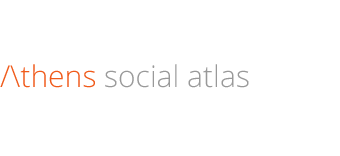The Project
Purpose
The Athens Social Atlas aims at highlighting and critically analysing topics concerning the social geography of Athens through multiple perspectives, focusing especially on the past 20 years. It contains texts and supporting material concerning the historical development of the metropolitan area from the 19th century on, the city’s social stratification, its governance, its international economic role, migrant groups, housing practices, the daily transport of its residents. However, the Atlas also includes articles focusing on specific areas of the city such as Omonia Sq., Anafiotika, the Faliron Delta, Ipokratous Str. and others. The variety of subjects and the variety in the scope of the articles explains the decision to create an unconventional online publication that would not follow the strict guidelines of a collective volume.
This Atlas is structured much more loosely than a standard collective volume. The articles / entries are classified into 15 main thematic groups/categories: History, Social Structure, Politics, Economy, Education, Health, Housing, Ethnic Groups, Culture, Built Environment, Planning, Transportation, Infrastructure, Neighbourhoods and Social Economy. These categories are the main method of classification, though readers may also look for entries using keywords (author’s name, subject). The articles have not been uniquely associated with one category but with every category pertaining to their subject. The atlas can therefore be used as a dictionary or an encyclopaedia and not as a typical book.
The Atlas’s digital form allows continuous addition of new entries and corrections/revisions of existing ones. Hence, the Athens Social Atlas is an ongoing and dynamic process of identifying and adding new entries that should further enhance its role. This process is open to anyone who wishes to contribute articles and/or provide relevant material. Proposals can be submitted online (Submission). The initial group of authors includes approximately 70 experienced and young experts from various scientific backgrounds (Team).
The Atlas content is subject to the terms and conditions of the “Attribution-NonCommercial 4.0 International (CC BY-NC 4.0)”
![]()
https://creativecommons.org/licenses/by-nc/4.0/deed.el
https://creativecommons.org/licenses/by-nc/4.0/
Authors
This Atlas would not have been possible without the pro bono participation of approximately 70 authors, who provided texts and other material for the website’s first on-line launch, in January 2016. We look forward to receiving more articles, from authors who have not yet published in the Atlas so as to make it richer and even more useful to scholars and the wider public interested in Greece and its capital city.
Academic and Scientific Bodies
Harokopio University
The Department of Geography of Harokopio University is the main institutional framework for the research project of the Atlas. As the Atlas covers multiple dimensions of the discipline of Geography, it was a natural fit to this Department. Several members of staff from this and other Departments of the University are among the Atlas’ contributing authors.
The French School of Athens
The French School of Athens is a public research organisation based in Athens. Its mission is to support research on the different aspects of Greece and the Mediterranean from ancient times to this day. In the context of its research on socio-spatial transformations in Athens, it ensures the translation of the Atlas’ articles into French and contributes in the development of the project as a research associate. The French translations are conducted by TEXTO.
National Centre for Social Research
The National Centre for Social Research has played a key role in the production of social atlases since its foundation.
- Kayser B (1964) Atlas Économique et Social de la Grèce, Athènes, ΕΚΚΕ.
- Nikolakopoulos H. (1984) Atlas of the legislative elections of the 18th of October 1981, Athens, EKKE.
- Maloutas T. (ed.) (2000, 2nd edition 2002) Social and Economic Atlas of Greece.1: Cities, Athens-Volos, EKKE-University of Thessaly.
In recent years, in collaboration with ELSTAT, EKKE has developed theonline Panorama of Greek census data 1991-2011 (https://panorama.statistics.gr/). The Panorama has been used as a data source in several articles included in the Atlas.
Hellenic Statistical Authority
The Hellenic Statistical Authority (ELSTAT) is the official producer of statistical population data for Greece on census scale. This Atlas would be much poorer if the authors of the articles it contains did not make good use of the detailed and reliable census data that ELSTAT has been producing for many decades through the Population and Housing Census. Almost every map depicting different social phenomena in great spatial detail within the Region of Attiki or in parts of it, has been produced using exclusively relevant data provided by ELSTAT, especially data originating from the last three Population Censuses (1991, 2001 και 2011).
Networks
Atlas Global Network
The Athens Social Atlas is founder of the Atlas Global Network. The Atlas Global Network is a collaboration platform of independent projects to map and analyze social structures, processes and practices in different cities across the globe. These projects come from initiatives that are not similar and do not intend to become similar. Their networking is a way to join forces in the effort of rendering more visible the attempts to identify, map and explore urban social processes and to expand the debate on the social dimensions of cities. By bringing to the fore and making these process more visible, the issues and stakes related to them can reach more easily the social and political agendas.
Sponsorship
Onassis Foundation
The Atlas project has been funded from a sponshorhip awarded to Harokopeio University of Athens from the Onassis Foundation.

